Don t Pay Off Your Student Loans!
Post on: 16 Март, 2015 No Comment

Dont Pay Off Your Student Loans!
Now that we all know that Good Debt exists. I want to talk about the best debt in the world: Student Loans!
I strongly suggest never paying off student loan debt that has a 5% or lower APR because it just doesnt make good financial sense. Paying off a loan doesnt increase your net worth by a single penny; it only ensures your net worth does not decrease! For the skeptics out there, Ive provided an example.
On January 1st, 2010, Phil, Jill, Will and Kevin all receive a $20,000 inheritance and have to decide what to do with it. Each of them also has a $20,000 balance on a student loan at 5% APR with eight years left to pay the loan. The monthly payments on that loan are $253.20.
- Phil likes having the money, so he keeps it in his bank account and just makes minimum payments on the loan.
- Jill thinks all debt is bad and pays off the entire loan immediately.
- Will likes to invest, so he makes minimum payments on the loan and invests in safe stock market funds.
- Kevin likes to invest aggressively, so he makes minimum payments on the loan and invests very aggressively in his 401k.
In this hypothetical situation, here a chart of what each persons account would look like at the end of the year, and the effective change on his or her net worth from the beginning of the year.
Ill give all the details of how this information was calculated below, but the main thing I want to point out is that Jills net worth didnt increase a single penny by paying off that loan. She went from having $20k in the bank to paying off $20k in debt. That, my friends, is what we call a net-zero transaction. She didnt lose money, but she didnt gain any either.
I cant say it enough; rich people dont get rich by avoiding debt . Very few business owners start a business with their own money. Almost all of them take out a loan, and the ones that are successful get a much larger return on that investment than the 8% or whatever interest they paid to borrow it.
If you want to be comfortable. Id suggest you pay off all your loans immediately. If you want to be rich. I suggest you get a current copy of your credit report and score. pay off all your bad debt, keep your good debt, and make your money grow!
photo credit: flickr.com/see-through-the-eye-of-g/
Now heres the math behind the numbers, for those of you who are nerdy like me. Feel free to stop reading now if math makes your head hurt.
Phil likes to horde money in his checking account that returns no interest. Maybe hes likes keeping it there for an emergency fund. He makes minimum payments on the student loans and leaves the rest in the bank. At the end of the year, he will have paid $2,085.75 in principal on the loan, and $952.63 in interest. The only good thing about this is that the $952.63 in student loan interest reduces his taxable income by that much. If hes in the 25% tax bracket, then he will save $238.16 on his tax bill, for a net worth loss of $714.47
Jill thinks all debt is bad debt so she pays off her student loan. By paying off the entire loan, she avoided paying $952.63 in interest (if she had made minimum payments on the loan for a year). It appears her one-year ROI is $952.63/$20,000, or 4.76%. However, if she had kept the loan and paid interest on student loans, that interest would have reduced her taxable income and she would have saved $238.16 on her 2010 tax bill, just like Phil.
When you subtract that from her cost avoidance, her actual return is just $714.47/$20,000, for 3.57%. She paid off a 5% loan but only got an effective 3.57% return. Thats not very good if you ask me.
Will needs to make 12 payments on that loan of $253.20, so he puts $3,038.38 in his checking account to cover those payments. Will has an extra $16,961.62 to invest, and he puts it in the stock market and receives the 14% return the S&P 500 had in 2010, or $2,374.63. Will paid $952.63 in interest on his student loan, but made $2,374.63 investing the difference and saved $238.16 on his taxes because of the student loan interest. His overall net gain was $1,660.15, or 8.3%.
Kevin had the same idea as Will, but invested much more aggressively in the market and got a 26.85% return in 2010. Using the same numbers as Will, except Kevins investing returned $4,554.19, his overall net gain was 22.77%.
Finally, I do understand that the returns we saw in the stock market in 2010 are not guaranteed in the future. However, is the past is any indication, it is very reasonable to believe you can get a return better than 3.57% in the market, which is what youd get by paying off the student loan.
This post was featured in the Carnival of Personal Finance at My Personal Finance Journey!














